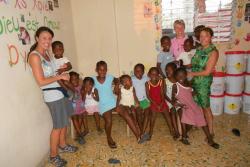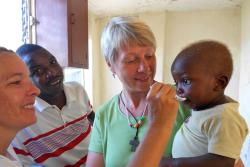 The percentage of Haitian people currently infected with worms is staggering; nearly 80% of Haiti’s 9.7 million people have some form of intestinal worms. These parasites are especially threatening to children who are malnourished already; intestinal worms can consume up to 20% of a child’s daily intake. Being infected can lead to dysentery, stunted growth, learning disabilities, and habitual fatigue.
The percentage of Haitian people currently infected with worms is staggering; nearly 80% of Haiti’s 9.7 million people have some form of intestinal worms. These parasites are especially threatening to children who are malnourished already; intestinal worms can consume up to 20% of a child’s daily intake. Being infected can lead to dysentery, stunted growth, learning disabilities, and habitual fatigue.
This unfortunate circumstance presents Haiti with dire consequences; 80% of Haiti’s population is under the age of 14. How is the country supposed to develop when its young adults are not prepared to lead Haiti and create a better future for themselves?

No doubt, treatment for intestinal worms decreases school absenteeism by 25% and increases adult income by 20%. This could be done at a rate of just 50 cents US for each child per year. Administering the medicine to children is easy; coordinating a program to administer the medicine to every Haitian child is a different story. To solve this issue, we have reached out to NGOs, local community groups, and churches, all of whom to which we donate albendazole pills (the de-worming medication) and train how to administer the drug. Over 22 such groups have helped us in our effort to cure children in Haiti of intestinal worms. One group, Missions of Love, has worked in the following locations:
- Good Shepherd Orphanage, Port-au-Prince — 18 residents at the orphanage have received albendazole pills.
- Bush Clinic in Odige, La Platte — 87 patients were seen by Missions of Love’s Haitian staff; an RN, a pharmacist, and a physician. Everyone that was diagnosed with intestinal worms was administered albenazole.
- Bel Air — 74 children have been treated since Missions of Love began working within Bel Air 16 months ago.
Thanks to the efforts of Missions of Love and other groups in Haiti fighting to treat children with intestinal worms, the future leaders of Haiti can have a chance to build a more productive existence and a more thriving country.
